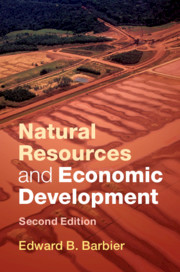Book contents
- Natural Resources and Economic Development
- Natural Resources and Economic Development
- Copyright page
- Dedication
- Contents
- Figures
- Tables
- Acknowledgments
- Introduction
- Part I Overview
- Part II Land and Water Use Change
- Part III Policies for Sustainable Resource-Based Development
- 8 Rural Poverty and Resource Degradation
- 9 Can Resource-Based Development Be Successful?
- 10 Policies for Sustainable Resource-Based Development in Poor Economies
- References
- Index
10 - Policies for Sustainable Resource-Based Development in Poor Economies
from Part III - Policies for Sustainable Resource-Based Development
Published online by Cambridge University Press: 31 August 2019
- Natural Resources and Economic Development
- Natural Resources and Economic Development
- Copyright page
- Dedication
- Contents
- Figures
- Tables
- Acknowledgments
- Introduction
- Part I Overview
- Part II Land and Water Use Change
- Part III Policies for Sustainable Resource-Based Development
- 8 Rural Poverty and Resource Degradation
- 9 Can Resource-Based Development Be Successful?
- 10 Policies for Sustainable Resource-Based Development in Poor Economies
- References
- Index
Summary
As discussed in Part I, the very minimum criterion for attaining sustainable development in a resource-rich economy is that this natural resource exploitation satisfies “weak sustainability” conditions. That is, the development path must ensure that, first, natural resources are managed efficiently so that any rents earned are maximized, and second, the rents resulting from the depletion of natural capital are invested into other productive assets in the economy.
- Type
- Chapter
- Information
- Natural Resources and Economic Development , pp. 358 - 389Publisher: Cambridge University PressPrint publication year: 2019



